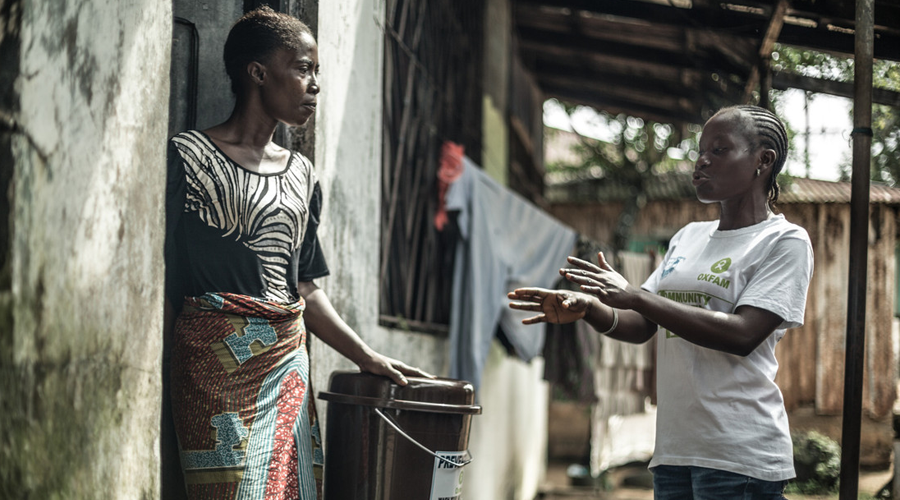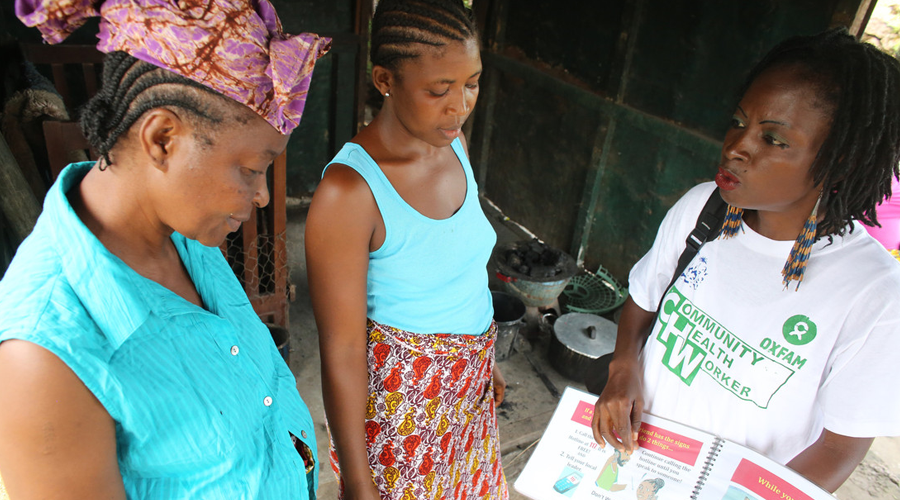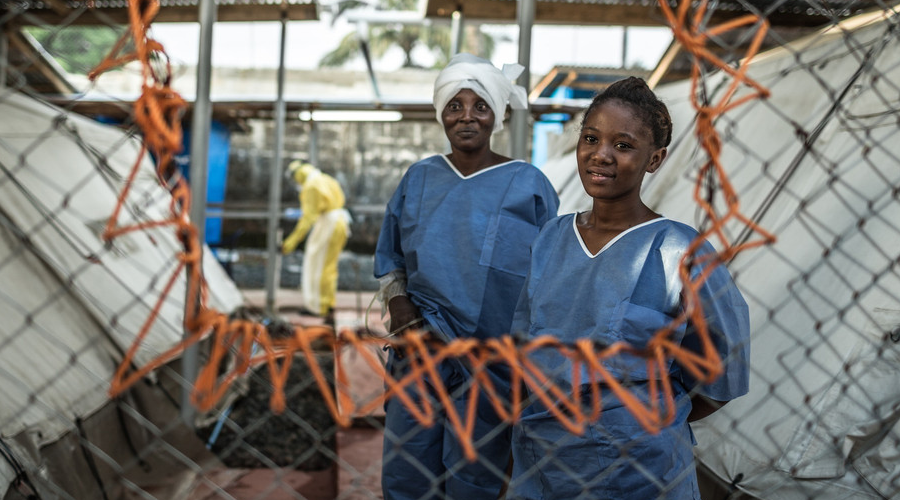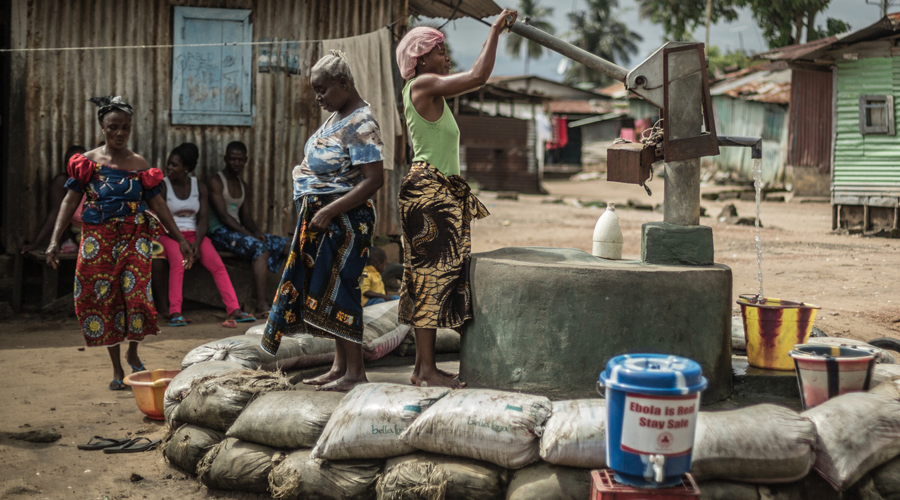Ebola: How Oxfam and its partners are responding
Oxfam is working with its partners to stop the transmission of the Ebola in West Africa through the delivery of effective, evidence-based, outbreak control measures. So far, Oxfam has directly reached over 1.3 million people.
The Situation
The Ebola outbreak has devastated communities in West Africa. We are working with communities to prevent new hotspots from emerging and to help them recover.
- There have been more than 25,000 cases reported.
- More than 11,000 people have died.
- Liberia has been declared Ebola-free. However, in Sierra Leone and Guinea, new disease 'hotspots' continue to appear. On June 10th, Sierra Leone extended its state of emergency for a further 90 days.
We can’t stop fighting this Ebola outbreak until we get to zero cases in West Africa – despite significant progress, there’s still a long way to go until the region is Ebola-free.
It should be a global priority to help these devastated countries recover with a post-Ebola ‘Marshall Plan’ led by governments with community consultation, which includes building health care that won’t fall apart in a crisis and improving the thousands of clinics and schools in dire need of water and sanitation.

How Oxfam is helping
Oxfam is responding to the Ebola crisis and contributing to recovery efforts. To date, we have reached over 1.3 million people by working with communities to raise awareness and supporting medical facilities with water, sanitation and cleaning equipment.
In Sierra Leone and Liberia, our programs have reached more than a million people and have included:
- providing medical facilities with water, sanitation, and cleaning equipment;
- training hundreds of community and village health committees to improve awareness and promote referrals and safe burial practices;
- training hundreds of volunteers to actively seek out cases door to door, encourage testing and referrals to health facilities, contact ambulances, and help families stay in touch with the progress of loved ones undergoing treatment; and
- helping communities to get back on their feet post-Ebola, by supporting women’s saving groups to restart their businesses, giving cash support to some of the most vulnerable and providing farmers with tools, seeds and training.
In nearby countries like Senegal, Gambia, Guinea Bissau, and Mali, we have been working closely with governments on preparedness and prevention measures - work that has included raising awareness through signs, radio broadcasts, and door-to-door campaigns; installation of hand-washing stations and latrines; and distribution of hygiene kits.
To successfully tackle Ebola, communities need to be fully involved in the fight against it. That's why Oxfam is piloting bottom-up approaches, with local people promoting health messages in their own communities. Without this, other measures such as treatment, safe burials and contact-tracing cannot work.

The Ebola Crisis and Gender
Since the very outbreak of Ebola, women’s rights groups have been and continue to be at the frontline of the Ebola response - and play a key role in reaching women in affected communities. But they must be further supported financially and integrated into response structures.
In Sierra Leone, Oxfam has partnered with the 50/50 women’s group to support female Ebola survivors, reinforcing prevention messages and calling attention to how women and girls may be particularly stigmatised.
Oxfam calls on all implementing agencies to integrate gender dimensions, gender equality and women’s participation throughout the outbreak management and recovery process, to ensure the needs of both women and men are being met, and gender equality is strengthened wherever possible. This must include gender and age disaggregated data collection. National gender assessments are underway in Sierra Leone and Liberia. Further research is also required to guide the gender aspects of this response and improve response and recovery.
There are broader gendered impacts to the Ebola crisis, particularly in terms of wider health needs and livelihoods.
Access to maternal health care was already very poor and Ebola has made this worse with the crisis diverting critical resources. This is undermining recent progress where the number of maternal deaths in Liberia and Sierra Leone had almost halved since 2000. There is real risk that women - who are too afraid to seek medical care - are at increased risk of dying at home from complications in childbirth.
There is an urgent need to mitigate the economic losses of women during the pandemic and to position them for economic recovery and eventually, economic empowerment in the aftermath of the pandemic.

What we still need to do
Getting to zero Ebola can only be achieved with full community engagement and increased focus on tracking down each chain of infection transmission.
We need to see this approach prioritized and coordinated at district level, in order to improve understanding, build trust in the effectiveness of services offered and change risky behavior. It’s now recognised by the World Health Organization and others that community engagement is vital, otherwise other aspects such as treatment, safe burials and contact tracing cannot work.
Right now, we need to support governments and communities in beginning to return to normal while maintaining measures to protect against Ebola. Looking forward, the outbreak has shattered the affected countries. Economies need to be restarted, jobs and incomes are urgently needed and health services need to be rebuilt. The world cannot just walk away after West Africa is declared Ebola-free.

Learn More
Ebola one year on - Hearts and homes were key to breakthrough
Watch On the other side of the string: Video on Ebola quarantine in Sierra Leone
Photos and stories from Freetown, Sierra Leone on Ebola and how it has forced thousands of families into quarantine
Ensuring a Gender-Integrated Response to the Ebola Crisis - September 2014
Oxfam Blog: The challenges of Ebola quarantines in Freetown and how Oxfam is helping
Oxfam Blog: Responding to the largest Ebola outbreak in historyOpens in a new window
The Humanitarian Coalition is Canada's only joint appeal mechanism. It is comprised of CARE Canada, Oxfam Canada, Oxfam-Québec, Plan Canada and Save the Children Canada. With a combined presence in more than 120 countries, we bring together Canada's leading aid agencies to finance relief efforts in times of international humanitarian crises. We work together to eliminate unnecessary competition, reduce the duplication of fundraising costs, and inform the public on humanitarian needs.
Updated July 28, 2015